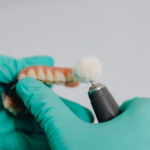Understanding Teeth Sensitivity: Causes, Treatments, and Prevention
Are you tired of wincing in pain every time you sip on a hot cup of coffee or indulge in an ice-cold dessert? If so, you might be one of the many individuals dealing with teeth sensitivity. Don’t worry; you’re not alone. Let’s delve into this common dental woe, understand its causes, explore treatments, and discover how to prevent it.
What is Teeth Sensitivity?
Teeth sensitivity, also known as dentin hypersensitivity, occurs when the enamel on your teeth wears down or your gums recede, exposing the underlying dentin. Dentin contains microscopic tubules filled with nerve endings. When these tubules are exposed to heat, cold, acidic, or sweet substances, it can trigger a sharp, sudden pain.
Common Causes of Teeth Sensitivity:
- Abrasive Brushing: Brushing your teeth too vigorously or with a hard-bristle toothbrush can erode enamel over time.
- Acidic Diet: Consuming a diet high in acidic foods and beverages can weaken enamel.
- Gum Recession: Receding gums can expose the tooth’s root surface, which is much more sensitive than enamel.
- Tooth Decay: Cavities can lead to sensitivity, especially if they reach the dentin.
- Grinding or Clenching: Bruxism, the habit of grinding or clenching teeth, can wear down enamel.
- Dental Procedures: Teeth may become sensitive after certain dental treatments like teeth whitening or fillings.
Treatments for Teeth Sensitivity:
- Desensitizing Toothpaste: Special toothpaste formulated for sensitive teeth can help block pain signals.
- Fluoride Gel: In-office fluoride treatments or prescription fluoride gels at home can strengthen enamel.
- Dental Bonding: A dentist can apply a bonding resin to cover exposed dentin.
- Gum Grafting: In severe cases of gum recession, gum grafting surgery can protect tooth roots.
- Mouthguards: For bruxism-related sensitivity, a custom mouthguard can prevent further enamel wear.
Preventing Teeth Sensitivity:
- Gentle Brushing: Use a soft-bristle toothbrush and a gentle brushing technique to avoid enamel erosion.
- Low-Acidity Diet: Reduce consumption of highly acidic foods and drinks.
- Regular Dental Check-ups: Routine dental visits can catch and address issues before they worsen.
- Fluoride Rinses: Incorporate fluoride mouthwash into your oral care routine to strengthen enamel.
- Avoid Grinding: If you grind your teeth, consider stress management techniques or a mouthguard.
Teeth sensitivity doesn’t have to be a daily struggle. With the right care and precautions, you can enjoy your favorite foods and beverages without cringing in pain. Remember, if your sensitivity persists or worsens, it’s essential to consult with a dentist to rule out any underlying dental issues. A pain-free, healthy smile is within your reach!








